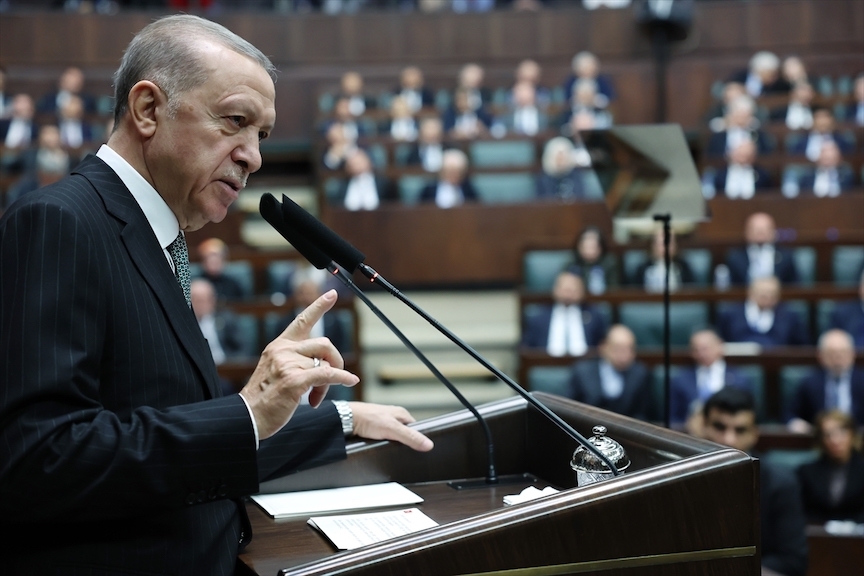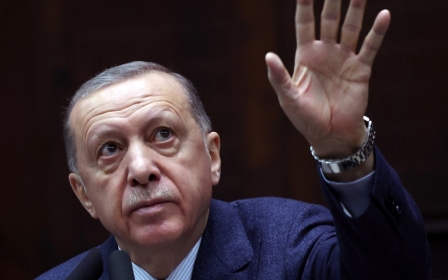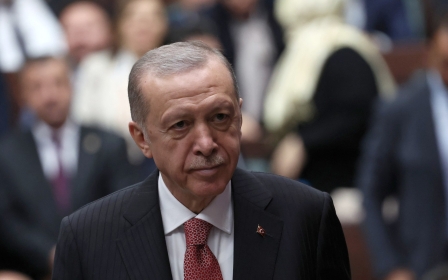Turkey elections: Erdogan keeps May voting date as his popularity remains high

Turkish President Recep Tayyip Erdogan is not deferring the upcoming general elections because he is confident of his chances, Middle East Eye has learned, as polls show his popularity remains undented after last month's earthquakes.
On Wednesday, Erdogan reiterated that presidential and parliamentary elections will be held in May, three months after the deadliest earthquakes in the nation's history killed more than 45,000 people.
The vote was originally slated for June but Erdogan brought it forward by one month earlier this year. After the deadly earthquakes hit last month there were questions about whether the vote would be pushed back to its original date.
However, Erdogan said during a speech in parliament that voters will teach the opposition a lesson in May by rallying around him and his ruling Justice and Development Party (AKP).
'He thinks the earthquake wouldn’t harm him, since he sees himself as the only leader who could deliver a comprehensive rebuilding project'
- Source close to Erdogan
“We will rebuild better buildings and bind up the wounds,” he said. “It isn't a weakness to talk about the shortcomings and ask for forgiveness. My nation will do what is necessary on 14 May.”
New MEE newsletter: Jerusalem Dispatch
Sign up to get the latest insights and analysis on Israel-Palestine, alongside Turkey Unpacked and other MEE newsletters
People close to the president told MEE that after the earthquake Erdogan was keen on holding elections on 14 May, but some within the AKP had second thoughts and wanted to see what the polls projected over the weekend.
“He thinks the earthquake wouldn’t harm him, since he sees himself as the only leader who could deliver a comprehensive rebuilding project for the 10 cities that were impacted by the quake,” a source close to Erdogan told MEE. “The candidate that can convince people of their reconstruction capabilities will have an upper hand during the campaign.”
The source added that Erdogan believes he is in an advantageous position due to recent government spending that alleviated some economic setbacks felt by people in recent years, as well as earthquake emergency work currently being carried out in cities like Adiyaman, Malatya, Kahramanmaras and others.
Erdogan said his government would establish a fund for swift reconstruction of the 10 affected provinces. He also promised to build thousands of new houses for earthquake survivors. More than 11,000 buildings collapsed in the quake-hit regions in February.
Society remains 'cautious'
Two separate sources familiar with nationwide surveys conducted by the party and the major polling companies after the earthquakes told MEE that support for AKP and Erdogan did not decrease.
“Erdogan enjoyed even more support in some polls,” one source said.
A public survey conducted by the Center for Social Impact Studies (Team) on 18-20 February with 1,930 voters indicated that the Erdogan-led People’s Alliance maintains 44 percent support, on a par with January polls before the earthquake, where Erdogan’s popularity surged to its highest in two years. The Team poll also indicated that Erdogan was up three points since January, performing better than the main opposition chief and his potential rival, Kemal Kilicdaroglu.
'Erdogan enjoyed even more support in some polls'
- Source with knowledge of polls
Team research director Ulas Tol says the general public was agitated by the slow government response in the first 48 hours after the earthquake, but this hasn't had a huge impact on voting behaviour.
“Society wants to leave the shock behind and it is cautious. It is giving a chance to the [government] to see what they would do,” he told MEE. “The opposition also couldn’t show a performance that could exceed the government’s [promises], they only stayed as the critics.”
Tol says the government’s strategy of framing the earthquake tragedy in emotional and spiritual terms, while blaming the opposition for opportunism, resonated with some of the voters.
Evren Balta, a professor at Istanbul's Ozyegin University, says it might take time for voters to digest the earthquake and change their voting preferences. Voters may even give credit to Erdogan’s promise of reconstruction.
“Major changes are the last thing you want in your life while your home is on fire,” she wrote. “You may even think that the person responsible for the burning of your house is the most competent person to put out that fire, and that his responsibility in that fire gives him a responsibility to put out that fire.”
Middle East Eye delivers independent and unrivalled coverage and analysis of the Middle East, North Africa and beyond. To learn more about republishing this content and the associated fees, please fill out this form. More about MEE can be found here.




